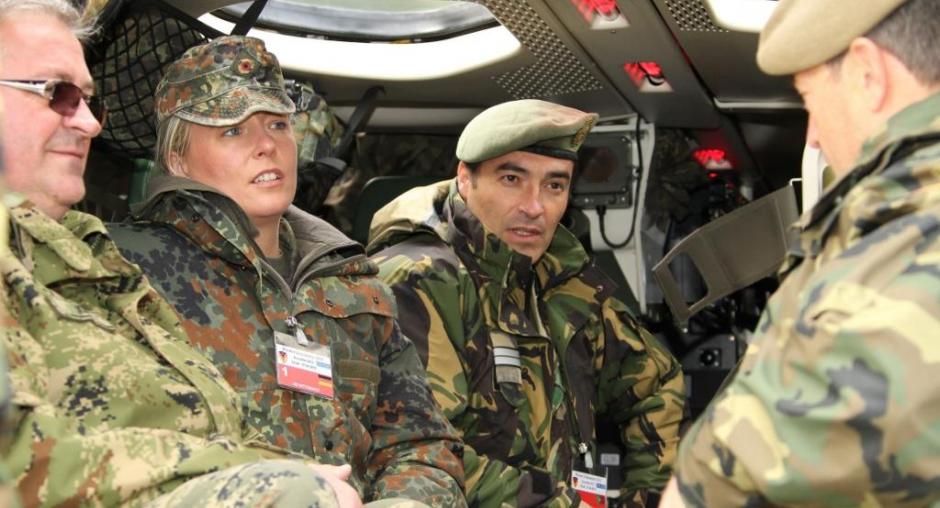OSCE to send military and civilian personnel to Ukraine

UPDATE at 20:00, 9 March: As of now, 30 OSCE participating States are participating in the activity, having sent up to two representatives each. There are 56 participants in total, from: Albania, Austria, Canada, Croatia, Czech Republic, Denmark, Estonia, Finland, France, Germany, Greece, Hungary, Iceland, Ireland, Italy, Latvia, Lithuania, Malta, the Netherlands, Norway, Poland, Portugal, Romania, Slovak Republic, Slovenia, Spain, Sweden, Turkey, the United Kingdom, and the United States. One representative from the OSCE Conflict Prevention Centre is also participating.
VIENNA, 5 March 2014 – Eighteen OSCE participating States decided to send 35 unarmed military personnel to Ukraine in response to its request.
The matter was discussed at a joint meeting of the Permanent Council and the Forum for Security Co-operation (FSC) in Vienna on 4 March 2014.
The visit is taking place under Chapter III of the Vienna Document 2011, which allows for voluntary hosting of visits to dispel concerns about unusual military activities. Ukraine has requested all OSCE participating States to send military representatives from 5 to 12 March 2014, starting in Odessa. This is the first time this mechanism has been activated.
As of now, eighteen OSCE participating States have responded positively to the request sending up to two representatives each. Canada, Czech Republic, Denmark, Estonia, Finland, France, Germany, Hungary, Ireland, Latvia, Lithuania, Norway, Poland, Slovakia, Sweden, Turkey, United Kingdom, and the United States. One representative from the OSCE Conflict Prevention Centre will also be participating. The military visit participants are on their way to Ukraine now.
OSCE Secretary General Lamberto Zannier said: "It is my hope that this military visit will help to de-escalate tensions in Ukraine. By providing an objective assessment of the facts on the ground, the OSCE will be better placed to foster a political solution to the current crisis through dialogue."
“Confidence-building and transparency are key elements of the OSCE approach to security, which seeks to foster openness and dialogue as the best way to resolve conflicts in our region," he added.
The Vienna Document 2011 is one of the main confidence-building measures developed by the OSCE. Under this document, all participating States are required to share information on their military forces, equipment and defence planning. The Document also provides for inspections and evaluation visits that can be conducted on the territory of any participating State that has armed forces.
Note to editors: Chapter III of the Vienna Document 2011 (full text see at //www.osce.org/fsc/86597)
VOLUNTARY HOSTING OF VISITS TO DISPEL CONCERNS ABOUT MILITARY ACTIVITIES
(18) In order to help to dispel concerns about military activities in the zone of application for CSBMs, participating States are encouraged to invite other participating States to take part in visits to areas on the territory of the host State in which there may be cause for such concerns. Such invitations will be without prejudice to any action taken under paragraphs (16) to (16.3).
(18.1) States invited to participate in such visits will include those which are understood to have concerns. At the time invitations are issued, the host State will communicate to all other participating States its intention to conduct the visit, indicating the reasons for the visit, the area to be visited, the States invited and the general arrangements to be adopted.
(18.2) Arrangements for such visits, including the number of the representatives from other participating States to be invited, will be at the discretion of the host State, which will bear the in-country costs. However, the host State should take appropriate account of the need to ensure the effectiveness of the visit, the maximum amount of openness and transparency and the safety and security of the invited representatives. It should also take account, as far as practicable, of the wishes of visiting representatives as regards the itinerary of the visit. The host State and the States which provide visiting personnel may circulate joint or individual comments on the visit to all other participating States.
***
For more details about the activation of the Vienna Document 2011 provisions, see //www.osce.org/cpc/34427, pages 17-20.
